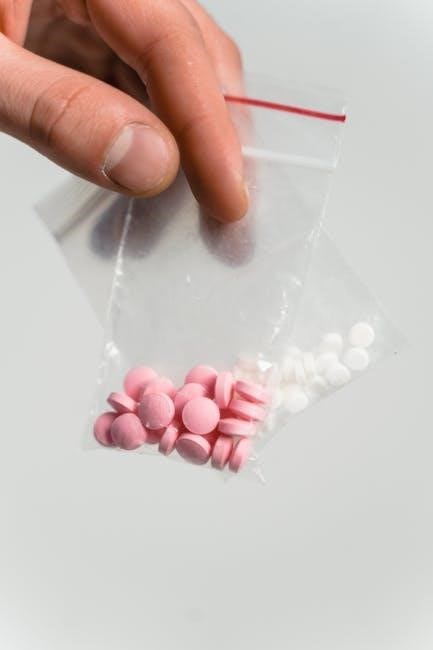The Addiction Treatment Homework Planner, 5th Edition, part of Wiley’s PracticePlanners series, offers structured exercises and resources for addressing addiction-related issues, including PTSD, trauma, and relapse prevention. Designed to support clinicians, it provides over 100 ready-to-use assignments tailored for various therapeutic settings, ensuring a comprehensive and adaptable approach to treatment planning.
Overview of the Wiley PracticePlanners Series
The Wiley PracticePlanners series is a comprehensive resource for mental health professionals, combining Treatment Planners and Homework Planners into one practical tool. Designed to streamline the treatment planning process, the series provides structured, evidence-based content for various clinical issues, including addiction, anxiety, depression, and more. Each planner offers ready-to-use forms, exercises, and documentation tools to enhance efficiency and consistency in treatment delivery. The series is widely recognized for its user-friendly approach, helping clinicians create tailored plans that align with client needs. By integrating homework assignments with treatment goals, the PracticePlanners series supports a collaborative approach between therapists and clients, fostering progress and accountability in diverse therapeutic settings. Its popularity stems from its adaptability and emphasis on practical, real-world applications.
Purpose and Scope of the Addiction Treatment Homework Planner
The Addiction Treatment Homework Planner, 5th Edition serves as a practical resource for mental health professionals, offering structured exercises to address various addiction-related issues. Its purpose is to provide clinicians with ready-to-use assignments that can be tailored to individual client needs, fostering engagement and accountability outside of therapy sessions. The scope includes a wide range of topics, such as chemical and nonchemical addictions, relapse prevention, and co-occurring disorders like PTSD and trauma. Designed to complement treatment plans, the planner helps clients develop essential skills for recovery, including coping strategies and problem-solving techniques. By bridging the gap between sessions, the exercises enhance therapeutic outcomes, making it an indispensable tool for effective addiction treatment.
Key Features of the 5th Edition
The 5th Edition of the Addiction Treatment Homework Planner offers enhanced features to support effective treatment planning. It includes over 100 ready-to-copy exercises, each tailored to address common addiction-related issues such as chemical dependency, relapse prevention, and trauma. The exercises are cross-referenced with the Addiction Treatment Planner, 5th Edition, ensuring seamless integration into treatment plans. New additions focus on emerging topics like PTSD, self-harm, and suicidal ideation, providing comprehensive coverage. The planner is organized for easy navigation, with exercises adaptable to individual, group, and family therapies. Its versatility makes it a valuable resource for clinicians seeking to enhance client engagement and outcomes in diverse therapeutic settings.

Structure and Organization of the Planner

The Addiction Treatment Homework Planner, 5th Edition is organized into clear chapters, each focusing on specific addiction-related issues. It includes structured homework assignments and exercises designed to support treatment goals, ensuring a logical flow for easy clinical use.
Chapter Breakdown and Content Organization
The Addiction Treatment Homework Planner, 5th Edition is divided into well-organized chapters, each addressing specific aspects of addiction and recovery. The book begins with foundational chapters on substance abuse and behavioral addictions, providing a comprehensive framework for treatment planning. Subsequent chapters delve into co-occurring disorders, such as PTSD and trauma, offering tailored homework assignments to address these complex issues. The planner includes problem-specific exercises, organized by common presenting issues, ensuring clinicians can quickly locate relevant materials. Each chapter is structured to promote progressive skill-building, with clear instructions and adaptable exercises. Appendices provide additional resources, including cross-references to the Addiction Treatment Planner, enhancing the book’s utility. This logical organization makes it an indispensable tool for therapists working with diverse client needs.
Types of Homework Assignments and Exercises
The Addiction Treatment Homework Planner, 5th Edition includes a variety of homework assignments designed to cater to different therapeutic needs. These exercises range from reflection-based activities that encourage introspection to action-oriented tasks that promote behavioral change. Cognitive-behavioral techniques are prominently featured, helping clients identify and challenge negative thought patterns. Additionally, the planner incorporates mindfulness-based exercises to enhance emotional regulation and stress management. Relapse prevention strategies are a key focus, with assignments that help clients develop coping skills and create personalized relapse prevention plans. The exercises are customizable, allowing clinicians to tailor them to individual client needs, making the planner a versatile resource for both individual and group therapy settings. Each assignment is designed to reinforce therapeutic goals and support long-term recovery.
How to Use the Planner Effectively
The Addiction Treatment Homework Planner, 5th Edition is designed for flexible and effective use in various therapeutic settings. Clinicians can customize the assignments to align with individual client needs, ensuring relevance and engagement. The planner should be integrated into the broader treatment plan, with homework serving as a bridge between sessions. Assignments should be reviewed and discussed in subsequent sessions to reinforce progress. Collaboration between client and clinician is key, as it fosters accountability and understanding. The exercises are adaptable, allowing for adjustments based on client responses and evolving needs. By consistently incorporating these homework assignments, clinicians can enhance the therapeutic process and support sustained recovery outcomes. Regular follow-up ensures the effectiveness of the interventions and promotes long-term behavior change.

Addressing Specific Addiction-Related Issues
The planner provides evidence-based strategies for addressing chemical and nonchemical addictions, PTSD, trauma, self-harm, and relapse prevention, offering tailored exercises to enhance treatment outcomes and client engagement.
Chemical and Nonchemical Addictions: A Comprehensive Approach
The 5th Edition covers both chemical and nonchemical addictions, offering tailored exercises to help clients address substance abuse and behavioral addictions like gambling or internet use. This comprehensive approach ensures clinicians can develop individualized treatment plans that target specific addictive behaviors, promoting long-term recovery and reducing relapse risks through practical, evidence-based strategies.
PTSD and Trauma-Informed Care in Addiction Treatment
The 5th Edition integrates trauma-informed care into addiction treatment, recognizing the high prevalence of PTSD among clients. It provides exercises designed to help clients process trauma safely, reducing the risk of triggering or re-traumatization. These assignments focus on building emotional regulation skills, enhancing resilience, and fostering a sense of safety and control. Clinicians can use these tools to create a supportive environment that addresses both addiction and trauma concurrently, promoting holistic healing and long-term recovery. The Planner emphasizes the importance of tailoring interventions to individual needs, ensuring clients receive compassionate and effective care.
Self-Harm and Suicidal Ideation: Intervention Strategies
The Addiction Treatment Homework Planner, 5th Edition, includes specific exercises to address self-harm and suicidal ideation, providing clinicians with tools to help clients manage these critical issues. Assignments focus on identifying triggers, developing coping strategies, and enhancing emotional regulation. Clients are guided to create safety plans and explore alternative behaviors to reduce self-harming tendencies. The Planner emphasizes a nonjudgmental, compassionate approach, encouraging clients to explore underlying emotions and develop healthier ways to cope with distress. These interventions are designed to foster resilience and hope, while addressing the complex interplay between addiction and self-harming behaviors. The exercises are tailored to support clients in building a stronger sense of self and improving their ability to navigate crises effectively.
Relapse Prevention and Coping Skills Development
The Addiction Treatment Homework Planner, 5th Edition, includes targeted exercises to help clients develop robust relapse prevention strategies and enhance their coping skills. These assignments guide clients in identifying high-risk situations and developing actionable plans to manage them effectively. Emphasis is placed on building problem-solving abilities, improving emotional regulation, and fostering healthier ways to handle stress and cravings. Clients are encouraged to create personalized relapse prevention plans, focusing on long-term sobriety and overall well-being. The Planner also incorporates exercises to strengthen support networks and promote self-monitoring techniques, empowering clients to maintain their progress and avoid relapse. These tools are designed to equip clients with the resilience and practical skills needed for sustained recovery.

Therapeutic Modalities and Treatment Settings
The Addiction Treatment Homework Planner, 5th Edition, provides adaptable exercises for individual, group, and family therapy settings, ensuring a comprehensive approach to treatment planning and recovery support.
Individual Therapy: Tailored Homework Assignments
The Addiction Treatment Homework Planner, 5th Edition, offers a wide range of tailored homework assignments specifically designed for individual therapy. These exercises are structured to address the unique needs of each client, ensuring personalized treatment plans. The planner includes activities that help clients identify triggers, develop coping mechanisms, and improve emotional regulation. Assignments are adaptable to the client’s specific circumstances, making them highly effective in individualized care. The exercises are cross-referenced with the Addiction Treatment Planner, allowing therapists to seamlessly integrate homework into the therapeutic process. This approach ensures that clients have the tools they need to work on their recovery outside of sessions, fostering long-term growth and relapse prevention. The focus is on creating a structured yet flexible framework for individualized treatment success.
Group Therapy: Adaptations for Group Settings
The Addiction Treatment Homework Planner, 5th Edition, includes adaptations for group therapy, offering exercises designed to foster collaboration and peer support. These assignments are tailored to group dynamics, encouraging interaction and shared learning experiences. Activities such as role-playing, group discussions, and collaborative problem-solving help clients practice skills and receive feedback in a supportive environment. The planner provides structured yet flexible exercises that align with individual treatment goals while promoting a sense of community. Therapists can customize assignments to meet the specific needs of the group, ensuring relevance and engagement. This approach enhances accountability and motivation, making group therapy a powerful complement to individualized care. The planner’s adaptability makes it an invaluable resource for therapists working in group settings.
Family Therapy: Involving Caregivers in the Recovery Process
The Addiction Treatment Homework Planner, 5th Edition, emphasizes the role of caregivers in recovery through family therapy exercises. These assignments are designed to strengthen communication, rebuild trust, and promote understanding within the family unit. Activities such as joint goal-setting, reflective journaling, and role-playing help caregivers and clients address relational dynamics and develop healthier interaction patterns. The planner includes exercises that educate families about addiction, reducing stigma and fostering empathy. By involving caregivers actively, the interventions enhance the client’s support system and contribute to a more sustainable recovery environment. This approach ensures that family members are empowered to support their loved ones effectively, creating a collaborative and lasting impact on the recovery journey.

Specialized Topics and Populations
The Addiction Treatment Homework Planner, 5th Edition, addresses diverse needs, including adolescent-specific exercises, adult psychotherapy, and cultural considerations, ensuring tailored support for varied populations and contexts.
Adolescent-Specific Homework Exercises
The Addiction Treatment Homework Planner, 5th Edition, includes tailored exercises for adolescents, addressing unique challenges such as peer pressure, academic stress, and family dynamics. These age-specific assignments focus on developing coping skills, improving decision-making, and enhancing self-esteem. Exercises are designed to be engaging and relevant, helping teens identify triggers and build resilience. The planner also incorporates strategies to involve parents or caregivers, fostering a supportive environment for recovery. By addressing the distinct needs of adolescents, the exercises promote long-term behavioral change and healthy development. This section is a valuable resource for therapists working with younger clients, ensuring interventions are both effective and developmentally appropriate.
Adult Psychotherapy Homework Planner: Key Differences
The Adult Psychotherapy Homework Planner differs from the Addiction Treatment Homework Planner by focusing on issues specific to adult populations, such as long-term addiction, co-occurring mental health disorders, and life transitions. It emphasizes evidence-based practices tailored to adults’ unique needs, addressing complex challenges like workplace stress, relationship dynamics, and chronic health issues. The exercises are designed to promote emotional regulation, interpersonal skills, and long-term recovery strategies. While the Addiction Treatment Planner focuses on addiction-specific issues, the Adult Psychotherapy Planner integrates broader therapeutic goals, making it a complementary tool for clinicians working with adults facing diverse mental health and addiction challenges.
Cultural and Diversity Considerations in Homework Assignments
The Addiction Treatment Homework Planner, 5th Edition emphasizes the importance of cultural and diversity considerations in homework assignments. Recognizing that clients come from diverse backgrounds, the planner includes exercises tailored to address cultural values, language preferences, and socioeconomic factors. It encourages clinicians to adapt assignments to meet the unique needs of individuals from various cultural contexts. For example, exercises may incorporate spirituality or family dynamics relevant to specific populations. This approach ensures that homework assignments are inclusive and effective, fostering engagement and progress in recovery. By integrating cultural sensitivity, the planner promotes equitable and person-centered care, making it a valuable resource for clinicians working with diverse client populations.
Case Studies and Examples
The Addiction Treatment Homework Planner, 5th Edition includes real-world case studies and examples, demonstrating successful applications of homework assignments in various therapeutic settings and client scenarios.
Real-World Applications of the Homework Planner
The Addiction Treatment Homework Planner, 5th Edition is widely applied in clinical settings, offering practical exercises tailored to diverse client needs. Its structured assignments are adaptable across various therapeutic environments, from individual therapy to group settings, ensuring consistent and measurable progress. Clinicians use the planner to address issues like relapse prevention, trauma, and coping skills, making it a versatile tool for treatment plans. Real-world examples demonstrate its effectiveness in helping clients develop essential life skills and maintain long-term recovery. The planner’s exercises are designed to be easily customized, fostering client engagement and accountability. This real-world application underscores its value as a comprehensive resource for addiction treatment professionals.

Success Stories and Client Outcomes
Clients using the Addiction Treatment Homework Planner, 5th Edition have demonstrated significant progress in their recovery journeys. Many have reported improved coping skills, reduced relapse rates, and enhanced emotional well-being. The structured assignments have helped individuals develop self-awareness and strategies to manage triggers effectively; Clinicians have noted that the planner’s exercises foster accountability and engagement, leading to sustained long-term recovery. Success stories highlight how the homework assignments have empowered clients to rebuild their lives and maintain sobriety. These positive outcomes underscore the planner’s effectiveness as a practical and adaptable tool in addiction treatment.
Challenges and Adaptations in Implementation
Implementing the Addiction Treatment Homework Planner, 5th Edition can present challenges, such as client resistance to completing assignments or difficulties in tailoring exercises to individual needs. Clinicians may also face limitations in clients’ access to resources or technology for digital homework submissions. To address these, practitioners often adapt assignments to better suit client circumstances, such as modifying exercises for varying cognitive levels or incorporating cultural considerations. Additionally, clinicians may integrate the planner’s exercises with other therapeutic modalities to enhance engagement and effectiveness. Despite these challenges, the planner’s flexibility allows for creative adaptations, ensuring its utility in diverse treatment settings and client populations.

Future Directions in Addiction Treatment Planning
Future directions emphasize integrating advanced therapies, digital tools, and personalized approaches to enhance treatment effectiveness and accessibility, ensuring adaptive and innovative care for diverse client needs.
Integration of New Therapies and Technologies
The Addiction Treatment Homework Planner, 5th Edition highlights the importance of integrating emerging therapies and technologies to enhance treatment outcomes. Advances in digital tools, such as mobile apps and telehealth platforms, enable greater accessibility and personalized care. Artificial intelligence (AI) can now assist in tailoring homework assignments to individual client needs, improving engagement and efficacy. Virtual reality (VR) is also being explored for immersive therapy experiences, helping clients practice coping skills in simulated environments. These innovations, combined with evidence-based practices, create a dynamic and adaptive approach to addiction treatment, ensuring that interventions remain cutting-edge and responsive to client demands.
Evidence-Based Practices and Research Updates
The Addiction Treatment Homework Planner, 5th Edition is grounded in evidence-based practices, ensuring interventions are backed by the latest research. It incorporates updates from clinical trials and studies on cognitive-behavioral therapy (CBT), mindfulness-based interventions, and trauma-informed care. The planner bridges the gap between research and practice by providing actionable exercises that align with proven therapeutic approaches. For instance, it includes updated strategies for addressing co-occurring disorders and relapse prevention. By integrating cutting-edge research, the planner offers clinicians practical tools to improve client outcomes. This edition reflects advancements in the field, making it a valuable resource for evidence-based addiction treatment planning.
Expanding the Scope of Homework Assignments
The Addiction Treatment Homework Planner, 5th Edition broadens its scope by introducing diverse homework assignments tailored to various client needs. It includes exercises for both chemical and nonchemical addictions, ensuring a comprehensive approach. New additions focus on emerging trends, such as digital addiction and gambling disorders. The planner also incorporates culturally sensitive assignments to address diverse client populations. By expanding its range, the book offers clinicians flexibility in creating personalized treatment plans. This edition emphasizes adaptability, allowing therapists to modify exercises for individual, group, or family settings. The expanded scope ensures that practitioners can address a wide array of addiction-related issues with evidence-based, tailored interventions.
The Addiction Treatment Homework Planner, 5th Edition is an essential resource for therapists, offering a comprehensive approach to treatment planning. Its evidence-based, adaptable assignments facilitate successful client outcomes and long-term recovery.
The Addiction Treatment Homework Planner, 5th Edition, is a vital tool for mental health professionals, providing structured, evidence-based exercises tailored to diverse addiction scenarios. Its comprehensive approach addresses chemical and nonchemical addictions, PTSD, self-harm, and relapse prevention, ensuring adaptable treatment plans. The Planner’s exercises are designed for individual, group, and family therapy settings, making it versatile for various clinical needs. By offering ready-to-use assignments, it streamlines the therapeutic process, empowering clients to develop coping skills and work toward sustainable recovery. This resource is indispensable for practitioners seeking to enhance treatment outcomes and client engagement, solidifying its place as a cornerstone in addiction treatment planning.
Final Thoughts on Effective Treatment Planning
The Addiction Treatment Homework Planner, 5th Edition, stands as a cornerstone in addiction treatment, offering a flexible and evidence-based approach to address diverse client needs. Its adaptability across therapeutic settings, including individual, group, and family therapy, underscores its versatility. By streamlining the therapeutic process with ready-to-use assignments, the Planner not only enhances treatment efficiency but also fosters client engagement and accountability. Its comprehensive coverage of addiction-related issues, such as PTSD and relapse prevention, equips practitioners with essential tools to support sustainable recovery. Ultimately, the Planner’s impact lies in its ability to personalize treatment plans, ensuring that each client receives tailored interventions that promote long-term success and well-being.

Leave a Reply